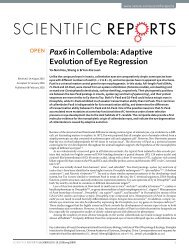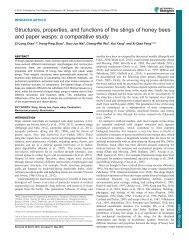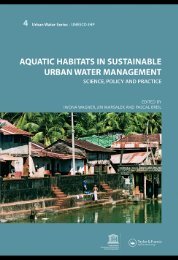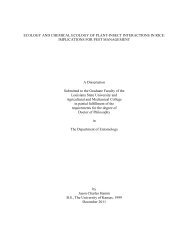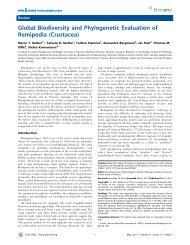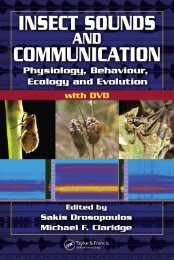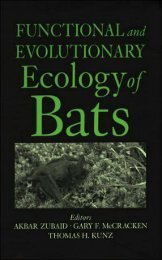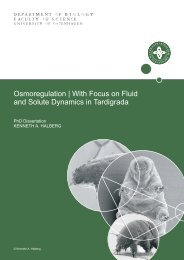You also want an ePaper? Increase the reach of your titles
YUMPU automatically turns print PDFs into web optimized ePapers that Google loves.
298 IV. DE ARACHNOLOGIA<br />
For more than 30 years I have been accustomed to write of "opilionology"<br />
and to call myself an "opilionologist", words that are to be<br />
recommended on account of their euphony. And in 1966 I coined the<br />
"araneist" (pronounced ara-nay-ist, not aranist), to denote one who<br />
studies spiders only and neglects the rest.<br />
It would be interesting if the students of harvestmen called themselves<br />
"phalangists" (though this is a nom. praeocc.); while the Amblypygi<br />
were followed by "phrynologists" and the U ropygi by "thelyphonists".<br />
Specialists in the Palpigradi could rejoice in the name "microthclyphonologists".<br />
Arachnologists need not be ashamed to confess,<br />
with Oliver Edwards, that" cheerfulness was always breaking in".<br />
A subject that is not unconnected with the above is that of the pronunciation<br />
of the many names that arachnologists have composed in<br />
their taxonomic progress.<br />
Half-a-century ago arachnologists were so rare and so widely dispersed<br />
that their communications with one another were almost wholly<br />
written or printed: the sounds of their speech were immaterial and were<br />
seldom considered. Today circumstances are luckily very different, and<br />
it is a common experience to hear a name pronounced not necessarily<br />
wrongly, but unexpectedly. Generally the surprising sound can be<br />
quickly interpreted: to hear "Nem-astoma" is at once to recognize<br />
"Nema-st6ma" but sometimes, and especially when speaker and listener<br />
belong to different nationalities, the characteristic intonations of either<br />
may delay understanding for a while.<br />
The British Arachnological Society raised the matter in 1971, and<br />
produced the following suggestions:<br />
1. In names of two syllables, the stress or accent falls on the first<br />
syllable: e.g. Z6ra, Phlegra.<br />
2. In names of three or four syllables, the convention of stressing the<br />
anti penultimate syllable is generally defensible: e.g. Sitticus.<br />
3. But if the penultimate is naturally an accented vowel, the stress<br />
falls on it: e.g. Loph6mma, Cycl6sa.<br />
4. The antipenultimate tradition is unacceptable for names compounded<br />
from two derivatives, which should be kept separate: e.g.<br />
Dolo-medes, not Dol-omm-edes, but some authorities say that junction<br />
is permissible on the grounds of convenience.<br />
5. The gin gnathos should be silent: e.g. Tetra-natha, not Tetragnatha.<br />
A Greek gamma is always hard, hence Teggenaria, not Tedgenana.<br />
6. Names of five or six syllables often fit the antipenultimate rule, but<br />
usually acquire a second stress near the beginning: e.g. Pepononcranium,<br />
6reonetides.<br />
35. LINGUISTIC ARACHNOLOGY 299<br />
Appeal was made to two professors of phonetics for guidance, and they<br />
agreed that no precise rules could be considered to be universal. Their<br />
advice was that each group of specialists had the responsibility of coming<br />
to agreement among themselves.<br />
Just as there ha,·e been some who have said that the chemistrv of<br />
chitin, silk and venom is not arachnology, so there must be many ~ho<br />
will feel that philology has no part in the study of the small animals that<br />
attract us so strongly. Their sentiments will be echoed by those who<br />
criticize zoological nomenclature, saying that zoology is not the study of<br />
animals' names. But just as we interpret the behaviour of our contemporaries<br />
by saying that it takes all sorts to make a world, so also may it be<br />
claimed that it takes all sorts to make a complete arachnology. Or we<br />
may change the words of Terence, while preserving his sentiment:<br />
"Arachnologicus sum; arachnologiae nil me alienum puto", a rough<br />
translation of which is "To be scientifically-minded it is neither necessary<br />
nor advantageous to be also illiterate".




